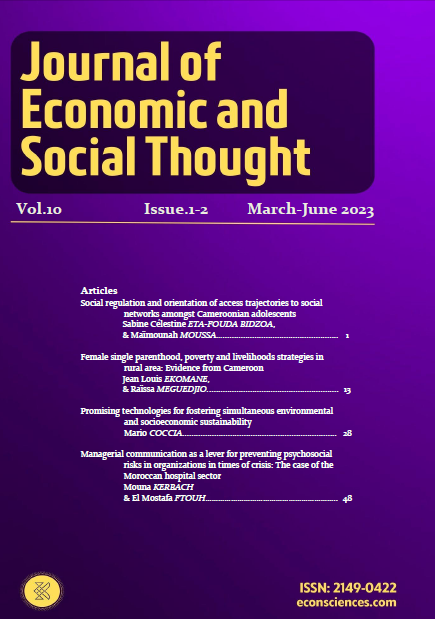Abstract
Abstract. In a fast-changing world, companies are facing many upheavals and challenges. Therefore, they must adapt to the different social, economic, technological and human changes which deeply affect their methods of organization and management. As a result, employees will be required to adopt new management methods and tools in order to guarantee stability and sustainability. Although psychosocial risks constitute a real public health problem that requires global reflection on the part of both decision-makers and managers, few studies in human resource management have focused on the determinants of these risks and more particularly their protective factors. Hence, this work falls within such a context and it is conducted in the frame of a quantitative research, aiming to put into perspective the role of managerial communication in the prevention of PSR among nursing staff in Moroccan public hospitals in times of crisis.
Keywords. PSR; Managerial communication; Prevention; Crisis.
JEL. I10; M50; J50.
References
Belorgey, P. & Van Laethem, N. (2016). La méga boite à outil du manager leader, Dunod. P.184-188.
Bernaud, J.L., Desrumaux, P., et Guédon, D. (2021). Psychologie de labientraitance professionnelle: Concepts, modèles et dispositifs. Dunod. doi. 10.3917/dunod.berna.2016.01
Bruchon-Schweitzer, M., & Boujut, E. (2021). Psychologie de la santé-2e éd: Concepts, méthodes et modèles. Dunod. doi. 10.3917/dunod.bruch.2014.01.0525
Delvaux, G. (2019), Le développement des Nouvelles Technologies de l'Information et de la Communication et le phénomène de l'hyperconnexion au travail. Approches en psychologie du travail et en gestion des ressources humaines.. Faculté́ des sciences économiques, sociales, politiques et de communication, Université́ catholique de Louvain,. Prom.: Camerman, Julie ; Auquier, Bauduin. [Retrieved from].
Dominique, W. (2003). L’autre mondialisation, Flammarion. doi. 10.4000/questionsdecommunication.7170
Douillet, P. (2013). La négociation de la prévention des risques psychosociaux : une occasion de renouveler le dialogue social, in Deboeck Supérieur, pp. 81-96. doi. 10.3917/neg.019.0081
Dragan, A. (2021). Applied Managerial Communication: Comments from the Perspective of Transactional Analysis, Annals of the University Dunarea de Jos of Galati: Fascicle: I, Economics & Applied Informatics, 27(3), 44-50. doi. 10.35219/eai15840409222
Durat, L. & Bartoli, A. (2014). La face cachée des risques psycho-sociaux: pour une requalification managériale et organisationnelle. Gestion et management public, 3(1), 17-43. doi. 10.3917/gmp.031.0017
Grosjean, M. & Lacoste, M. (1999). Communication et intelligence collective: le travail à l’hôpital. Presses Universitaires de France. doi. 10.3917/puf.grosj.1999.01
Haberey-Knuessi, V. (2013). L'enjeu communicationnel dans le système hospitalier. Recherche en soins infirmiers, 115,8-18. doi. 10.3917/rsi.115.0008
Marie-Agnès, D. Fabienne, D. Ghislaine, B, marie, M. Mantha, B. Michel, V., (2018), Repérage des facteurs de risques psychosociaux chez des médecins hospitaliers, Archives des Maladies Professionnelles et de l'Environnement, 79(3), 283-284. doi. 10.1016/j.admp.2018.03.152
Maurice, I. et Valérie, B. (2015), La communication managériale méthodes et bonnes pratiques, Donod.
Moisdon, J-C. & Tonneau, D. (1999). La démarche gestionnaire à l’hôpital. Seli Arslan; Lavoisier. doi. 10.3166/RFG.235.113-127
Montreuil, E. (2020). Prévenir les Risques psychosociaux et améliorer la Qualité de Vie au travail: des outils pour agir efficacement, 4eme Edition, Dunod, 272p. doi. 10.3917/dunod.montr.2020.01
Saunier, C-S. (2018). Le management des risques psychosociaux au sein des organisations: utopie ou solution de développement ? Laboratoire CORHIS Université Paul Valéry 3.
Strauss, A. (1992). La trame de la négociation: sociologie qualitative et interactionniste. L’Harmattan. doi. 10.3917/neg.002.023

This work is licensed under a Creative Commons Attribution-NonCommercial 4.0 International License.
